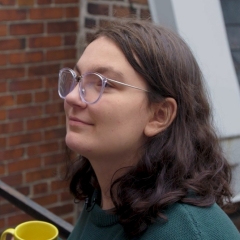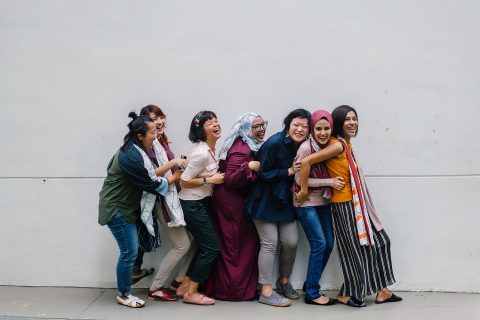Interdisciplinary Studies in Sexuality (BA)
Virtual information sessions
Discover what makes Concordia's Faculty of Arts and Science stand out as a leader in the humanities and social and natural sciences, including academic opportunities, hands-on learning and how to achieve your goals.
Why choose Interdisciplinary Studies in Sexuality?
Sexuality plays a large role in the way society organizes itself, shaping how we develop a sense of self and build relationships. In a world where our ideas about sexuality are being contested and transformed, an interdisciplinary academic approach anchors knowledge as you develop insight into the complex and sometimes contradictory understandings of sexuality across history and in diverse contexts today.
Areas of focus include the study of lesbian, gay, bisexual, transgender, transsexual, intersex, queer, asexual, heterosexual, pansexual, monogamous, non-monogamous and polyamourous lives, at the intersections of feminism, gender, race, class, politics, culture and more. Courses highlight Indigenous, Black, people of colour, migrant, diasporic, transnational, decolonizing, postcolonial, disability and other critical frameworks, and you’ll cross traditional disciplinary boundaries by engaging with sexuality in areas like art history, film, biology, religion and sociology, to name just a few.
Montreal is a diverse city and through practicum placements (available to students in the major program), you'll have the opportunity to gain first-hand experience with many different communities that shape the arts, public health, advocacy and activism.
Program highlights
- Practicum opportunities that integrate creative production and community engagement and help put theory into practice in activist and advocacy contexts
- Join a close-knit student community within the Simone de Beauvoir Institute
- Topics include queer cinema, HIV/AIDS, transnational sexuality, kink, queer theory and more
Special funding for out-of-province students
Up to $4000 for undergraduate programs.
Program structure
A Bachelor of Arts degree takes a minimum of three or four years (90 – 120 credits) of full-time study, depending on your academic background.
Program options
- Major in Interdisciplinary Studies in Sexuality (42 credits)
- Minor in Interdisciplinary Studies in Sexuality (27 credits)
Courses
The Major/Minor in Interdisciplinary Studies in Sexuality - offered jointly by the Faculty of Fine Arts and the Faculty of Arts and Science - draws its curriculum from a variety of disciplines including anthropology, art history, cultural studies, film studies, fine arts, history, literature, philosophy, psychology, religion, sociology and women's studies. Its purpose is to investigate empirical, theoretical and creative aspects of sexuality.
United States students: A U.S. Federal Student Aid-eligible version of this program is offered. This version meets all U.S. regulations (such as no co-operative education or e-courses) for eligible programs.
Admission criteria
Minimum cut-off averages and course requirements
- Quebec CEGEP: 20 (Minor: DEC)
- High School: C+
- ACT or SAT is NOT required
- Canadian curricula course requirements
- Accepted international qualifications
- International Baccalaureate (IB) diploma: 26
- International Baccalaureate Career-related Programme (CP): 26
- Baccalauréat français: 11
- British system of education (GCE):
- A-levels: At least two A-level exams CD or
- AS-levels: At least 4 AS-level exams with equivalent results or
- BTEC: Level 3 Diploma or Extended Diploma in a related subject area with equivalent results
- Additional information for British System of Education (GCE) applicants
- University Transfers (internal/external): C
Minimum cut-off averages should be used as indicators. The cut-off data may change depending on the applicant pool. Applicants who meet the stated minimum requirements are not guaranteed admission to these programs.
Application deadlines
It’s not too late to apply
Most undergraduate programs are still accepting applications for fall 2025.

FALL ENTRY (September)
Deadline: March 1
International applicants: Apply no later than February 1 to allow time for immigration document processing. However, applying earlier is strongly recommended. Immigration processing times vary by country, and delays could prevent you from starting your studies on time.

WINTER ENTRY (January)
Deadline: November 1
International applicants: Apply no later than August 1 to allow time for immigration document processing. However, applying earlier is strongly recommended. Immigration processing times vary by country, and delays could prevent you from starting your studies on time.
We reserve the right to close admission to a program at any time after the official deadline without prior notice.
After your degree
Thanks to Concordia's emphasis on taking an interdisciplinary approach to your field of study, you'll graduate with a depth of knowledge informed by an understanding of how your subject connects to the wider world. You'll be ideally positioned to succeed in a professional role that demands rigorous analytical thinking, sharp communication skills and the ability to approach problem-solving from multiple dimensions.
Student stories

Scarlet Guy
Bachelor of Arts Honours History: Public History
Find out how Scarlet Guy discovers a world of interdisciplinary learning and community support in the Faculty of Arts and Science.
Other programs of interest

We are one of the most established and respected Communication Studies programs in North America, and are well known for combining creative media production with the study of media theory, criticism and history.
Department
Department of Communication Studies
Faculty

When you study public policy analysis, policy advocacy and community economic development, you’ll graduate ready to jump into in the policy-making process in private, public, and community sectors.
Department
School of Community and Public Affairs
Faculty

Women’s studies is about examining the role of women in society both today and in the past, and recognizing their contributions to human achievement.
Department
Faculty


